Larry Kramer remembered for his love at moving memorial service
Love. Dr. Anthony Fauci recalled Kramer inviting him and his wife to see his 1992 play, “The Destiny of Me,” where both the good doctor and Kramer are the main only slightly fictionalized characters, with Kramer’s love-hate relationship with Fauci on full display. Fauci said Kramer approached him with trepidation after the show, asking, “Are … Read More
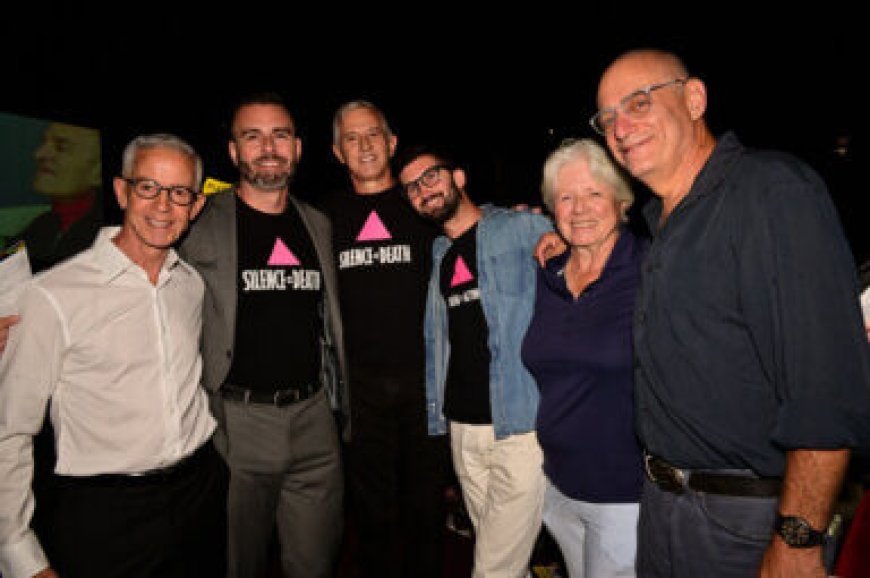
Love.
Dr. Anthony Fauci recalled Kramer inviting him and his wife to see his 1992 play, “The Destiny of Me,” where both the good doctor and Kramer are the main only slightly fictionalized characters, with Kramer’s love-hate relationship with Fauci on full display.
Fauci said Kramer approached him with trepidation after the show, asking, “Are you pissed off at me?”
“Not at all offended,” Fauci replied.
Fauci delivered those remarks at a June 26 memorial for Kramer at the Lucille Lortel Theater, where friends and loved ones gathered to remember the late AIDS activist, playwright, and author.
Fauci praised Kramer’s “passion for the plight of his people.”
“Despite his confrontationalism,” Fauci said, “he had a pure, unselfish goal” — alerting people to “the seriousness of the epidemic.” (Though as Kramer himself said in Jean Carlomusto’s fine documentary, “Larry Kramer in Love and Anger,” excerpted at the start of the service, “Why can’t you call a plague a plague!?”)
Fauci concluded, “I’m so pleased that the last words we got to say to each other were, ‘I love you.’”
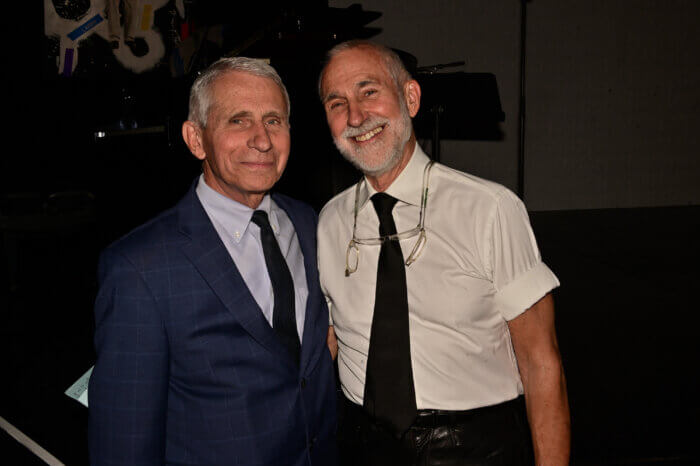
Will Schwalbe said he’d known Kramer “all his life.”
“He loved being gay,” he said, “and David Webster was the love of his life. He loved living in New York, loved his friends. Incapable of keeping a secret, he loved gossip. He clung ferociously to life and that’s why he fought so hard for all of us. And in light of the current climate, Schwalbe said, “We need you more than ever.”
Kramer’s longtime friend and classmate at Yale, New Yorker writer Calvin Trillin, said Kramer was so miserable as an undergraduate that he tried to take his own life but was nevertheless a regular at class reunions — and at their 35th reunion, Kramer eschewed the official reunion cap for one that said, “ACT UP.”
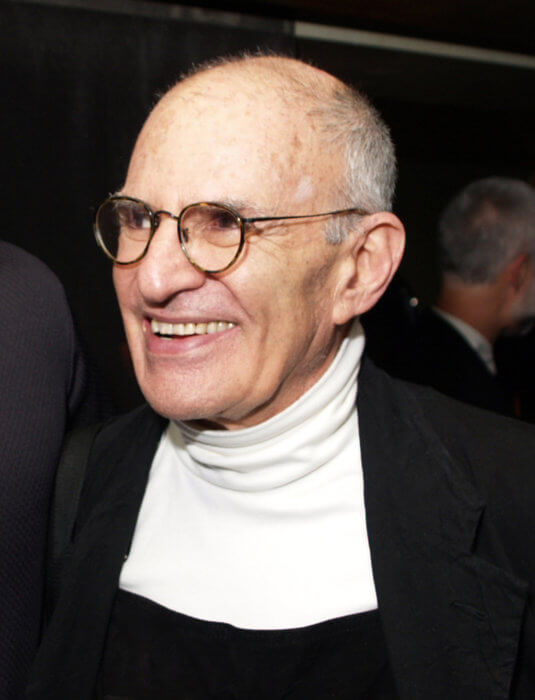
“Acting up was his default mode,” Trillin added. “When I mentioned to a newspaper-editor friend that I was driving Kramer up to another reunion, our 45th, he replied, ‘I’ve been a little cool on Larry since he accused me of murdering my friend.’ ‘Talk about hypersensitive,’ I said,” in the wry tone Trillin is famous for. “‘He probably wasn’t even mad.'”
“He was a sweetheart to me and a devoted friend to my wife Alice,” Trillin said. He said they drove to New Haven together when Kramer was to receive an honorary degree at Yale for “courage, tenacity in speaking out, and acting up.”
“By then,” Trillin said, “I recognized the fundamental fact about ‘the most belligerent man in America.’ He was right. When it came to what had to be done and what wasn’t being done to combat AIDS, Kramer was right. People were dying and he understood that polite requests to the medical establishment were not going to save them. In other words, my friend Larry Kramer was ‘a pain in the ass’ as a matter of policy.”
Playwright Tony Kushner said, “I felt peculiar privilege to have a front row seat to a fire that seemed so pure it was almost unearthly — fueled by consuming itself, yet almost miraculously unlikely to expire not until the expiration of its vessel,” Larry Kramer. “What I loved about Larry most of all were his words: his plays, his essays, his novels” and “his fearless, scrupulous truth-telling.”
“Dear Larry,” Kushner said, “if there’s heaven… I hope that enlightenment includes your finally knowing whether Lincoln was gay” — the source of great friction between them when Kushner did not deal with Lincoln’s homosexuality in his screenplay for the Steven Spielberg biopic on Abe.
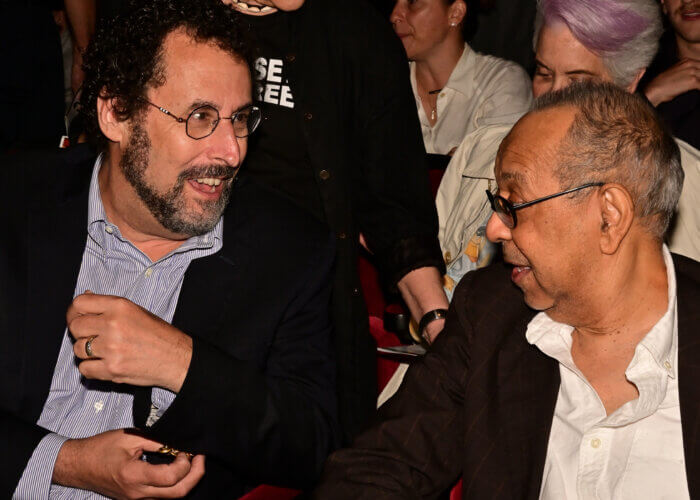
Actor Tonya Pinkins, who starred in Kramer’s “Just Say No,” said, “He changed my life.” With his work, she said, “He took something and turned it into a cudgel to change the world. I’ve been inspired to do the same ever since.”
John Cameron Mitchell, who starred as the Kramer character in “The Destiny of Me,” sang a heart-rending rendition of “Make Believe.”
George C. Wolfe, who directed the Tony-winning revival of “The Normal Heart,” Kramer’s timely 1985 play about the first years of AIDS, said he kept Kramer away from rehearsals. But when Kramer saw the final one, Wolfe said Kramer came to him and said, “I never realized I’d written a love story.”
Sheila Nevins said that as executive producer of HBO documentaries, she had to get to know Kramer in order to know what needed to be included in Carlomusto’s film.
“I was Larry’s girlfriend,” Nevins said. It was a time when Kramer was in and out of hospitals. She said his attitude was: “’I will not die. I will not be forgotten.’ And he kept getting better.”
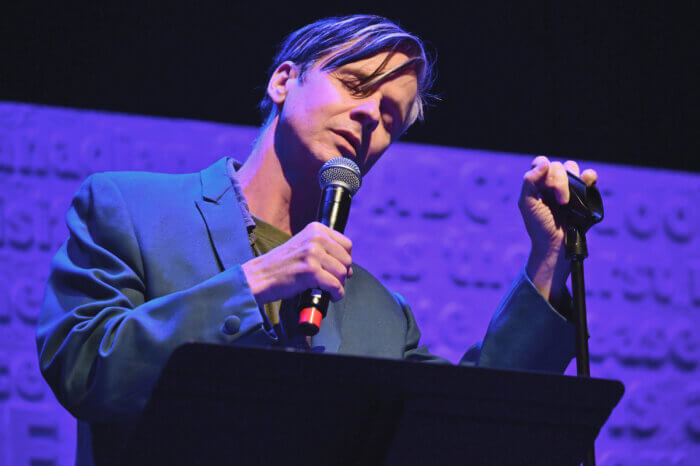
Peter Staley, Ann Northrop, and Eric Sawyer took the stage: “We’re three of Larry’s ACT UP children,” Staley said. While noting that “Larry wasn’t any good at building and sustaining an organization…his righteous rage” sparked “two pillars of the community”: GMHC and ACT UP.
Sawyer said Kramer “always used anger creatively.” And it was after Kramer quit ACT UP periodically that he produced some of his most creative work.
Northrop noted that on the Gay USA TV show she and I co-host, the only spoken words in our weekly intro are Kramer’s: “We have to really escalate the noise we make so that we’ll be heard!” She reflected on how Kramer’s anger likely stemmed from his time in college when he tried to take his own life amidst purges of gay men at Yale and Harvard, where they were given the choice of conversion therapy or expulsion.
There was also a reading from an elegiac passage in Kramer’s novel, “Faggots,” which read: “All my friends are here and it is hard to leave you.”
Kramer’s husband, Webster, concluded the service.
“I hope Larry is enjoying this,” Webster said. “I think about him every day.” He thanked all the doctors who kept Kramer alive and gave him a liver transplant (despite his having HIV) that bought him an extra 22 years. And he talked about holding hands with Kramer at his last moments.
“I believe he was ready to let go,” he said.
But this wonderful service brought him back and filled our hearts.
It was a star-studded audience. Also on hand were Joel Grey, Joe Mantello, and John Benjamin Hickey, who all starred in productions of Kramer’s “The Normal Heart”; Kramer’s biographer, Bill Goldstein; GMHC co-founder Dr. Larry Mass; Kramer’s doctor, Howard Grossman; actors Patti LuPone and Julie Halston; Broadway Cares executive director Tom Viola; a host of ACT UP veterans; and Kramer’s legion of admirers.
Read more on Larry Kramer from Gay City News: “Larry Kramer, Whose Anger, Activism & Art Fueled Fight Against AIDS, Dies at 84”
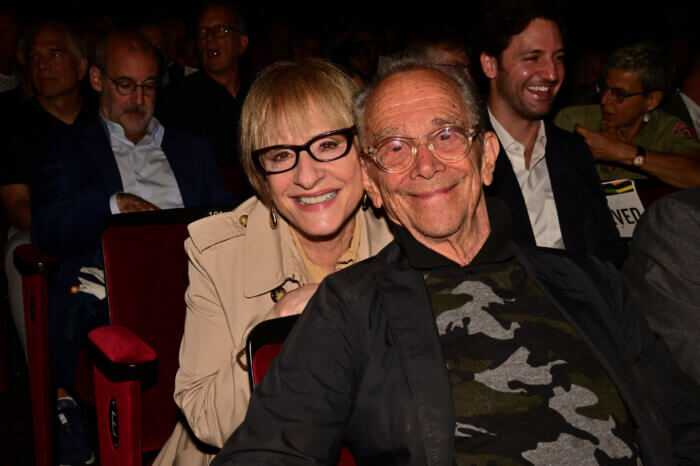
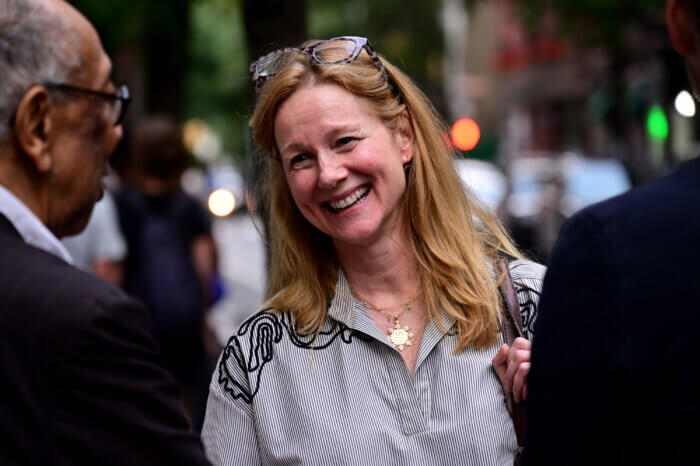

 Mark
Mark 





